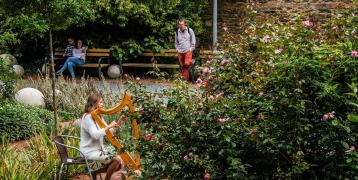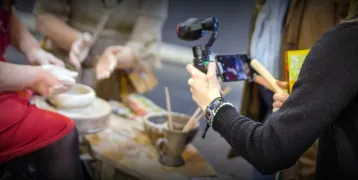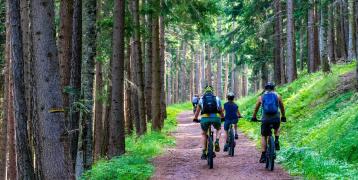Alternative tourism: key learnings
On 20 November 2024, the Policy Learning Platform organised a workshop in Vittorio Veneto, Italy, bringing together public authorities and Interreg Europe project partners to discuss the concept of alternative tourism. Participants have explored different approaches like ethical, slow, and creative tourism, which offer ways to rethink local and regional approaches to tourism promotion.
What was the workshop about?
Participants explored Vittorio Veneto's achievements in the Interreg Europe project Local Flavours, highlighting the potential of interregional cooperation. They also delved into the concept of "alternative tourism" through keynote speeches, group discussions, and focused presentations.
To learn more about this topic, explore the conclusions report our experts have prepared for you.
It contains insights related to the industrial transition, as well as inspiring Interreg Europe good practices and policy recommendations.
Featured projects
Featured good practices
Co-creating the alternative tourism offer
This practice from a small locality in Latvia is a great example of a community based creative tourism. Together with university students and the local community a new life was given to the rich local legends by utilizing them for regional promotion through storytelling and a new visual identity. The Legends of Āraiši is based on public private collaboration and gives chance to involve local businesses – as storytellers/guides, craftsmen, musicians, caterers, food and souvenir makers and accommodation providers.
Thanks to the joint branding of the region there has been an increase in visitors, services and local entrepreneurship (including new infrastructure in terms of housing). Due to the small size of the region each new service or SME in the tourism sector can increase the touristic offer in the region. Therefore, the alternative tourism offer is highly dependent on community cooperation and joint marketing efforts.
Astrotourism is about the observation of the starry sky, planets and constellations and exploring scientific knowledge. In the interior of the Coimbra region, the dark sky has been transformed into a tourist asset, making it possible to develop a range of activities that go beyond mere observation of the sky to become a strategic commitment that reconciles tourism development with social and environmental sustainability, thus transforming an apparent weakness of the territory (sparsity of population) into a distinctive asset of economic and cultural value.
This transformation has happened in a multistakeholder framework through collaboration among local authorities, civil society, and private stakeholders, integrating the diverse perspectives in the design and development of the tourism product, services and experience.
Food and sports as potential alternative tourism offers
A nationwide network of rural households in Romania offering visitors a local, safe, unique culinary experience in the countryside. Started in 2019, it emerged from the need of offering tourists from Vama Buzăului Commune - Brașov Metropolitan Area dining options during their stay. The concept supports and encourages local producers in the countryside and sets strict limits to the origin of the food being served (at least 70% hyperlocal). The Points solve a market gap between supply and demand as in such smaller areas traditional restaurant businesses are often not viable.
While initiated by an association, a similar model could be replicated in other regions under the auspices of the local government, especially considering that the Local Gastronomic Points origin story involved coordination with the local mayor, county council and its implementation has required close collaboration with food safety authorities as well as an enactment of a specific national law governing the Gastronomic Points.
A three-day family-friendly event designed for cycling enthusiasts and for promoting recreational activities in untouched nature. It takes place on Fruška Gora National Park known for its beautiful landscapes and rich cultural and historical heritage. Besides sports, the event includes tasting of Vojvodina’s gastronomic specialties, cultural programs and workshops, making it ideal for visitors of all ages.
The aim of the event is to raise awareness of the importance and protection of Fruška Gora, while promoting the tourist, cultural and economic potential of this region. While run by an association and volunteers, this practice highlights for public authorities the opportunities that scenic rural areas have around event and sports tourism.
Study visit
Home to the Zavřel Foundation, Sarmede is internationally recognized for its dedication to the art of illustration and storytelling. As part of the Interreg Europe Local Flavour Project, this good practice highlights how culture and tourism can be intertwined to foster community development. The Sarmede’s charming murals and its International School of Illustration showcase how the village has become a hub of artistic creativity and cultural tourism.





